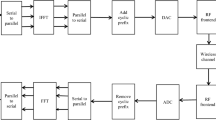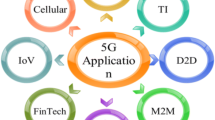Abstract
The low complexity time–frequency multiplex estimator and equalizer transceiver design are proposed to combat the RF impairment problems for the zero-IF transceiver of multi-carrier systems. Moreover, the proposed preamble can estimate and compensate the receiver (Rx) in-phase and quadrature-phase (IQ) imbalance, carrier frequency offset (CFO), and channel impulse response parameters. There are two parts in the proposed system. Firstly, all parameters of impairments are estimated by the proposed time–frequency multiplex estimator design with the iterative cancellation scheme. Secondly, the iterative group pair equalizer with the estimated parameters is proposed to eliminate the RF impairments effect and detect the transmitted signal with low complexity advantage. Simulation results confirm that the proposed estimator can provide the reliable performance over the severe IQ imbalance, CFO, and multipath fading channel environments.








Similar content being viewed by others
References
IEEE 802.16e standard. (2005). Air interface for fixed and mobile broadband wireless access systems.
GPP TS 36.101 standard. (2011). Evolved universal terrestrial radio access (E-UTRA); user equipment (UE) radio transmission and reception, Release October 10, 2011.
Schenk, T. (2008). RF imperfections in high-rate wireless systems: Impact and digital compensation. Netherlands: Springer.
Chiuch, T. D., & Tsai, P. Y. (2012). Baseband receiver design for wireless MIMO-OFDM communications. Singapore: Wiley.
Hsu, C. J., Cheng, R., & Sheen, W. H. (2009). Joint least squares estimation of frequency, DC offset, I–Q imbalance, and channel in MIMO receivers. IEEE Transactions on Vehicular Technology, 58(5), 2201–2213.
Hsu, C. J., & Sheen, W. H. (2012). Joint calibration of transmitter and receiver impairments in direct-conversion radio architecture. IEEE Transactions on Wireless Communications, 11(2), 832–841.
Tarighat, A., Bagheri, R., & Sayed, A. H. (2005). Compensation schemes and performance analysis of IQ imbalances in OFDM receivers. IEEE Transactions on Signal Processing, 53(8), 3257–3268.
Liang, J. R., & Kuo, C. H. (2010). LS-based joint estimation of carrier frequency offset and IQ imbalance in OFDM systems. In International symposium on next-generation electronics (ISNE) (pp. 52–55).
Xing, G., Shen, M., & Liu, H. (2005). Frequency offset and I/Q imbalance compensation for direct-conversion receivers. IEEE Transactions on Wireless Communications, 4(2), 673–680.
Liu, T., & Li, H. (2011). Joint estimation of carrier frequency offset, dc offset and I/Q imbalance for OFDM systems. Signal Processing, 91, 1329–1333.
Liu, T., & Li, H. (2012). Blind estimation of carrier frequency offset, I/Q imbalance and DC offset for OFDM systems. Journal on Advances in Signal Processing,. doi:10.1186/1687-6180-2012-105.
Chung, Y. H., & Phoong, S. M. (2012). OFDM channel estimation in the presence of receiver I/Q imbalance and CFO using pilot symbols. IEICE Transactions on Communications, E95-B(2), 531–539.
Marey, M., Samir, M., & Dobre, O. A. (2012). EM-based joint channel estimation and IQ imbalances for OFDM systems. IEEE Transactions on Broadcasting, 58, 106–113.
Marey, M., Samir, M., & Ahmed, M. H. (2013). Joint estimation of transmitter and receiver IQ imbalance with ML detection for Alamouti OFDM systems. IEEE Transactions on Vehicular Technology, 62(6), 2847–2853.
Zhang, W., & Yin, Q. (2012). Linear receiver for OFDMA uplink with both CFOs and IQ imbalances. IEICE Transactions on Communications, E95-B, 639–642.
Zhang, C., Xiao, Z., Gao, B., Su, L., & Jin, D. (2014). Three-stage treatment of TX/RX IQ imbalance and channel with CFO for SC-FDE systems. IEEE Communications Letters, 18(2), 297–300.
Chu, D. C. (1972). Polyphase codes with good periodic correlation properties. IEEE Transactions on Information Theory, 18(4), 531–532.
Acknowledgments
This work was supported by the Ministry of Science and Technology, ROC, under Contract MOST 104-2218-E-155-002.
Author information
Authors and Affiliations
Corresponding author
Rights and permissions
About this article
Cite this article
Lin, KM., Deng, JH. & Feng, KT. Time–Frequency Multiplex Transceiver Design with RX IQ Imbalance, CFO, and Multipath Channel Estimation and Compensation for Multicarrier Systems. Wireless Pers Commun 87, 107–123 (2016). https://doi.org/10.1007/s11277-015-3031-9
Published:
Issue Date:
DOI: https://doi.org/10.1007/s11277-015-3031-9




